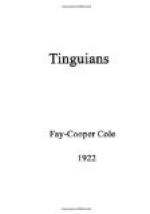In Lumaba, a town strongly influenced by the Igorot, the Ubaiya regularly precedes the rice planting, as well as the first use of a newly constructed field. While conforming, in general, to that already described, a part of the procedure is somewhat different. On the day before the ceremony, the men go to the mountains and gather lono stalks, one for each house and two for the town gate. The two reeds are placed crosswise of the entrance to the village and serve as a sign of taboo, and thereafter no one may enter until they are officially removed. To do so would necessitate the repetition of the ceremony, and the offender would be obliged to provide all the things necessary for it. Likewise, no one may wear a hat or prepare food during the period of taboo.
The next day is known as Bignas, and at dawn all the men arm themselves with bamboo poles. With these they beat about under the houses and throughout the town, in order to drive away any evil spirits who may be lurking about. Having effectively rid the town, they force the invisible beings ahead of them to the river, where they deposit the poles. They return to the village singing and shouting, and are met at the gate by the women, who hold ladders, one on each side of the entrance, so that they meet at the top and thus form a path by which the men may enter without breaking the interdict. At the guardian stones, they pause long enough to sacrifice a pig and a rooster, and offer blood and rice to the spirits, and then they proceed to the center of the village, where they dance tadek and da-eng until dusk. At nightfall a pig is killed, its flesh is divided among the people, and a lono stalk, after being dipped in the blood, is given to a member of each family. This is carried home, and is placed on the outside wall as a sign that the ceremony has been held.
If the sun is shining the following morning, the lakay will go outside the town to gather wood. Upon his return the people are again free to fish and hunt, but work is forbidden until evening. Should the sun fail to appear, all remain quietly in the village until the lakay can remove the taboo by his wood gathering.
In Manabo the ceremony is a mixture of the two types just described, and is always held at the time of planting and when droughts occur. [217]
The procedure at harvest time varies considerably in different districts, but the usual custom is for a woman, from each family, to go to the fields and cut alone until she has harvested one hundred bundles. During this time she may use no salt, but a little sand is placed in her food as a substitute. No outsider may enter the dwelling during this preliminary cutting. So strictly is this rule observed that the writer has been absolutely excluded from homes where, on other occasions, he was a welcome guest. In Lumaba and vicinity it is the custom to sacrifice a chicken two days before the harvest begins, and




